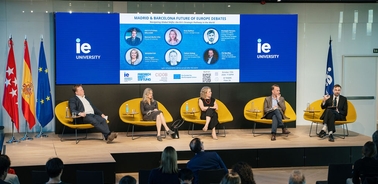Navigating global shifts: insights from the Madrid-Barcelona Future of Europe Debates

On October 17, 18, the GPC held the third session of the Madrid-Barcelona Future of Europe Debates.
The Global Policy Center held the third session of the Madrid-Barcelona Future of Europe Debates on October 17 and 18, 2024.
The initiative brought together global European thought leaders to explore key issues shaping the EU’s future. This public session, titled “Navigating Global Shifts: the EU’s Strategic Pathway,” was co-organized by the Friedrich Ebert Foundation, CIDOB (Barcelona Centre for International Affairs) and IE University’s Global Policy Center (GPC). It addressed a range of complex topics as the EU concludes this pivotal electoral year. Dr. Ilke Toygur, Director of the IE Global Policy Center, moderated a panel of experts—including Rosa Balfour, Pol Morillas Bassedas, Giuseppe Porcaro and Fabian Zuleeg—who shared insights on the EU’s internal and external challenges and its role on the global stage.
The session opened with a discussion on the EU’s internal cohesion and democratic vitality, where experts highlighted the urgent need for unity amid rising polarization. Panelists emphasized that a strong democratic foundation is essential not only for the EU’s internal stability but also for its influence abroad. This theme underscored the interconnectedness of foreign and domestic policy, with experts noting that external challenges can affect policy coherence within the Union and emphasizing the importance of reinforcing democratic values as a cornerstone of EU cohesion.
The conversation then shifted to the EU’s evolving security and defense strategy. With the ongoing war in Ukraine and escalating global tensions, panelists stressed the need for a more diverse and resilient approach to security. They discussed the EU’s identity as a peace-promoting body and the balancing act required to maintain this stance while responding to emerging security threats. This included deliberations on how the EU might navigate its commitment to peace in an increasingly turbulent global environment, highlighting the need to reevaluate defensive strategies.
The final focus was on the EU’s geo-economic strategy and its pursuit of strategic autonomy. Experts discussed how the EU can strengthen its economic influence while navigating interdependencies with key global regions, particularly at this time when the global economy is undergoing significant shifts. They explored the EU’s reliance on international supply chains and debated pathways to ensure economic resilience that aligns with the Union’s values and strategic goals. This discussion emphasized the need for adaptability in the EU’s approach to global economic engagement.
As part of the Future of Europe research line, this session contributes to ongoing efforts to analyze and address the EU’s pressing issues and equip it for a strategic future. Further insights from this series are available on the IE Global Policy Center website.